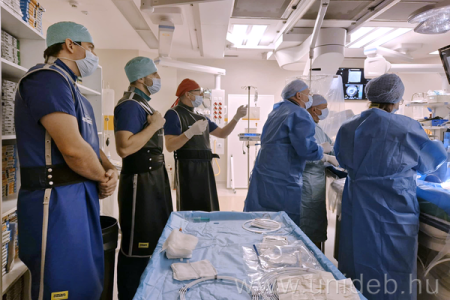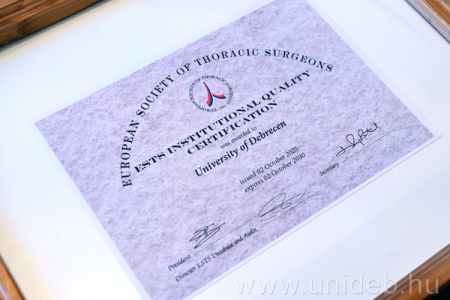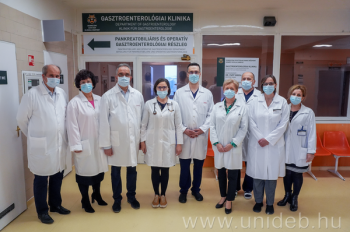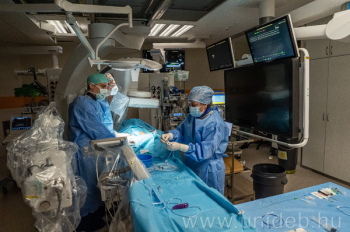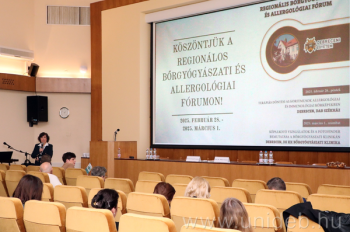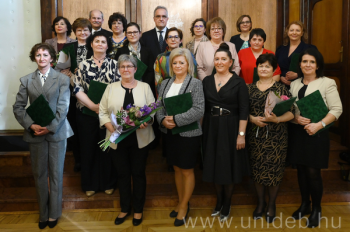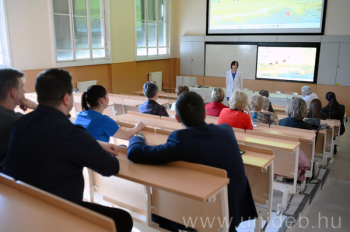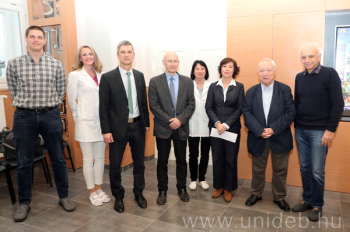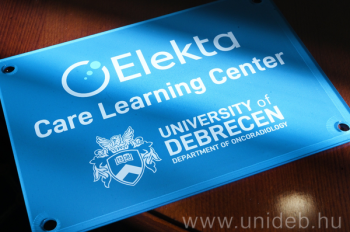The participants attending a conference in Oradea, Romania, could watch a live broadcast of catheter procedures performed at the Cardiology and Heart Surgery Clinic of the Clinical Center of the University of Debrecen. It was the most recent solutions for a minimally invasive treatment of complete coronary artery occlusion that were presented at this Romanian-Hungarian professional forum as well as during the training course preceding it.
Hírek DE KK Nagyerdei Campus címkével
Thoracic Surgery Department (TSD) of the Surgical Clinic of the University of Debrecen has once again received accreditation from the European Society of Thoracic Surgeons (ESTS), confirming that this institution provides European-level care to patients. TSD first earned this prestigious international certification back in 2012, becoming the first such institution in Eastern Europe to do so. Since then, the certificate has had to be reearned every five years based on strict criteria.
A new 20-bed inpatient unit of the Gastroenterology Clinic in the Clinical Center of the University of Debrecen has been opened recently at Kenézy Gyula Campus. This ward is to treat primarily patients suffering from pancreatic and biliary diseases, and it has been designed to provide an even higher level of patient care than before. The activities of the new unit were presented to the management of the Clinical Center on Monday.
The catheter aortic valve implantation performed at the Department of Cardiology and Cardiac Surgery of the University of Debrecen Clinical Centre was shown live on Wednesday to the participants of an international conference in India. The clinic's staff has a wealth of experience in this field, having performed more than seven hundred such procedures to date. The surgery was carried out in a state-of-the-art hybrid laboratory, built with a budget of around one billion forints.
The new CT scanner, which was inaugurated at the Clinical Center of the University of Debrecen, enables faster examinations and more precise diagnoses for patients. This world-class CT scanner will aid the diagnosis and treatment of cardiology patients, and will assist in cardiac and thoracic surgery, neurology, neurosurgery, and oncological surgery as well. The high-tech equipment was acquired through a unique financing arrangement.
In Hungary, it is only the Clinical Center of the University of Debrecen that can offer a state-funded FotoFinder-assisted examination for the early detection of melanoma. The new imaging device capable of providing such a chance was presented to a professional audience at this year's Regional Dermatology and Allergology Forum. At their two-day meeting, which started on Friday, the attending specialists also discussed the most recently available therapeutic options for allergic and immunological diseases.
Nine health workers of the Clinical Centre of the University of Debrecen were honoured for their high quality and exemplary professional work on Wednesday at a ceremony held on the occasion of the Hungarian Nurses' Day. At the event, in addition to the Outstanding Worker Medal and the Reward Award, Presidential Letters of Commendation and the titles of Chief Clinical Physician were also presented.
In Hungary, around 10,000 new cases of lung cancer are diagnosed every year and around nine thousand people die from the disease, even though there is a good chance of curing lung cancer if it is detected at an early stage. The latest research findings and state-of-the-art treatment options for lung cancer were discussed at a professional symposium held on Monday at the Pulmonology Clinic of the University of Debrecen Clinical Centre in connection with World Cancer Day.
Doctors and specialists from Slovakia recently visited the Burns Department of the Dermatology Clinic of the University of Debrecen Clinical Centre. The Hungarian and Slovakian specialists presented the latest technologies and surgical techniques they use and shared their experience and expertise in daily patient care.
The Oncoradiological Clinic of the University of Debrecen has been awarded the title Elekta Qualified Regional Training Centre. This means that, from next year, the clinic will offer theoretical and practical training programs for oncoradiology specialists from Central and Eastern Europe. The relevant cooperation agreement was signed by the representatives of our institution and those of the company Elekta on Wednesday at the University of Debrecen.
